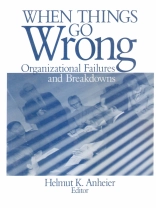To understand success, you must first understand failure. This understanding is especially critical since failure is a phenomenon that is much more common to everyday life, businesses, and government practice than standard theory would lead us to assume. Failure manifests itself in many ways, including breakdowns, bankruptcies, and other forms of organizational catastrophes and fiascoes. Thus, learning from failure will enable success. When Things Go Wrong brings together contributions from 24 leading scholars who examine the causes, patterns, process, and outcomes of such failures from economic, managerial, cognitive and political perspectives. This book presents failure as a relative concept in terms of the expectations and strategies of stakeholders putting a claim on the performance of the organization and the notion of success. It challenges future research in this field to combine both economic and non-economic performance measures to assess organizational tendencies toward success and failure and to differentiate between failure as process and failure as an outcome.
Tabela de Conteúdo
PART ONE: INTRODUCTION
Organizational Failures, Breakdowns and Bankruptcies – Helmut K Anheier and Lynne Moulton
An Introduction
PART TWO: ORGANIZATIONS AND FAILURE
Costly Information – Lynne G Zucker and Michael R Darby
Firm Transformation, Exit, or Persistent Failure
Decision Overreach as a Reason for Failure – David Wilson, David J Hickson and Susan J Miller
How Organisations Can Overbalance
‘Tales from the Grave’ – Mark Hager et al
Organizations′ Accounts of Their Own Demise
Organizational Coping, Failure, and Success – Renate Mayntz
Academies of Sciences in Central and Eastern Europe
PART THREE: THE POLITICAL ECONOMY OF FAILURE AND BANKRUPTCY
Successful Failure – Wolfgang Seibel
An Alternative View of Organizational Coping
Veiled Politics – Kevin J Delaney
Bankruptcy as a Structured Organizational Field
The Politics of Blame Avoidance – Mark Bovens et al
Defensive Tactics in a Dutch Crime-Fighting Fiasco
Creating the Agents of Corporate Rescue – Terence C Halliday and Bruce G Carruthers
Professionalization of Insolvency
PART FOUR: THE COGNITIVE CONSTRUCTION OF FAILURE
Prosaic Organizational Failure – Lee Clarke and Charles Perrow
Permanent Failure and the Failure of Organizational Performance – Marshall W Meyer
PART FIVE: STRUCTURAL FAILURES
Success and Failure in Institutional Development – Frank P Romo and Helmut K Anheier
A Network Approach
Stalemate – Helmut K Anheier and Frank P Romo
A Structural Analysis of Organizational Failure
PART SIX: CONCLUSION
Studying Organizational Failures – Helmut K Anheier and Lynne Moulton
Sobre o autor
Helmut K. Anheier, Ph D, is President and Dean at the Hertie School of Governance, and holds a chair of sociology at Heidelberg University. He received his Ph D from Yale University in 1986, was a senior researcher at John Hopkins School of Public Policy, Professor of Public Policy and Social Welfare at UCLA′s Luskin School of Public Affairs, and Centennial Professor at the London School of Economics. Professor Anheier founded and directed the Centre for Civil Society at LSE, the Center for Civil Society at UCLA, and the Center for Social Investment at Heidelberg. Before embarking on an academic career, he served as social affairs officer to the United Nations. He is author of over 400 publications, and won various international prizes and recognitions for his scholarship. Amongst his recent book publications are Nonprofit Organizations – Theory, Management, Policy (London: Routledge, 2014), A Versatile American Institution: The Changing Ideals and Realities of Philanthropic Foundations with David Hammack (Washington, DC: Brookings, 2013) and The Global Studies Encyclopedia with Mark Juergensmeyer (5 vols, Sage, 2012). He is the principal academic lead of the Hertie School´s annual Governance Report (Oxford University Press, 2013-), and currently working on projects relating to indicator research, social innovation, and success and failure in philanthropy.












